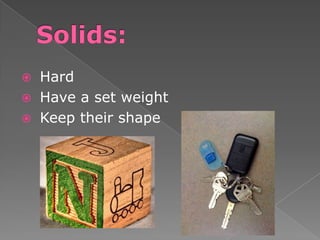Matter and physical properties
- 1. Matter and Physical Properties
- 2. Matter:Has weight and takes up spaceSolidLiquid Gas
- 3. Solids:Hard Have a set weight Keep their shape
- 4. Liquids: Do NOT have their own shapeMove on their ownTake the shape of their container
- 5. Gases: Can NOT have their own shapeTake the shape of their containerDo not weigh anything
- 6. Physical Properties:Used for putting into groups by: Color ShapeSize Smell Float Sink
- 7. Color:The first things you seeRedBlueYellowGreenOrange Purple
- 9. Size: Big Medium Small
- 11. Sink:When something drops below or underneathExample: Egg dropped in water
- 12. Float:Something that stays above waterSits on top of the waterExample: Raft in a pool
- 13. Sorting: Put everything into groups Groups are based on similaritiesExample groups: color, size, or shape
- 14. SizeColorShape
- 15. How would you sort these?
- 16. Picture Credits Log Pile wildlife habitat, By Andy Roberts, This photo was taken on October 23, 2009, Creative Commons Attribution Water on Light, By Pete Birkinshaw, This photo was taken on July 18, 2010, Creative Commons Attribution Balloons, By Crystal, This photo was taken on July 14, 2006, Creative Commons Attribution American soda, By poolie, This photo was taken on May 7, 2008, Creative Commons Attribution Juice Boxes, January 17, 201011, By Steven Depolo, This photo was taken on January 17, 2010, Creative Commons Attribution * Brick Wall *, By Par├®e, This photo was taken on January 1, 2008, Creative Commons Attribution Keys, By Jamison Judd, This photo was taken on April 16, 2008, Creative Commons Attribution N, By chefranden, This photo was taken on November 18, 2006, Creative Commons Attribution Finished Pool Construction, By Bill Jacobus, This photo was taken on March 9, 2006, Creative Commons Attribution Caroline, By scienceheath, (No real name given) This photo was taken on March 15, 2010, Creative Commons AttributionYay!, By tanakawho, (No real name given) This photo was taken on July 22, 2007, Creative Commons Attribution Big white cloud over a clear blue sky, By HoriaVarlan, This photo was taken on April 29, 2008, Creative Commons26photo07, By Michael Miller, This photo was taken on December 20, 2007, Creative Commons Attribution big and small, By bangl1, (No real name given) This photo was taken on October 25, 2009, Creative Commons Attributions Smell, By Dennis Wong, This photo was taken on February 22, 2009, Creative Commons Attributions Beach balls floating on the pond before the Slush Cup, By Frank Kovalchek, This photo was taken on April 25, 2010, Creative Commons Attribution Cypriot wreck, By Verity Cridland, This photo was taken on February 15, 2007, Creative Commons AttributionJeff Gordon Dupont Chevy Impala, By The Freewheeling Daredevil, This photo was taken on February 14, 2008, Creative Commons Attributionroom and board knit pillow ŌĆō inspiration, By _overanalyzer, (No real name given) This photo was taken on May 20, 2008, Creative Commons Attributionwatermelon,By Purple Slog, This photo was taken on November 6, 2008, Creative Commons AttributionMarks & Spencer Wedding Hamper, By SitiSaad, (No real name given) This photo was taken on March 21, 2008, Creative Commons AttributionPurple rage, By net_efekt, (No real name given) This photo was taken on April 14, 2009, Creative Commons Attribution Hot Peppers, By namestartswithj89, (No real name given) This photo was taken on August 30, 2009, Creative Commons Attribution Day 1 - place the egg in the water, By Kristin This, photo was taken on June 14, 2008, Creative Commons Attribution In the pink Project 365(2) Day 228, By Keith Williamson, This photo was taken on September 18, 2010, Creative Commons Attribution Sorting Skittles by Colour, By Ben Watts, This photo was taken on June 14, 2009, Creative Commons Attribution Cheese In Shapes, By Michael Pereckas, This photo was taken on October 7, 2007, Creative Commons Attribution recycled fun...really!, By EvelynGiggles, (No real name given) This photo was taken on July 23, 2009, Creative Commons Attribution Many colored straws thrown on top of each other, By HoriaVarlan, This photo was taken on November 11, 2008, Creative Commons Attribution
Editor's Notes
- #3: Explain that the balloons and fire extinguisher have gas in them
- #4: Very common, have students give other examples too
- #5: Water is the most common, You can poor them,Possibly drink them ,Come in all shapes and sizes, Is actually VERY strong (can move rocks)
- #6: Can be very useful, oxygen is a gas and we breath that, always use caution, Oxygen, Chlorine (first ask if any have pools then explain how chlorine gives off a gas), Helium for balloons
- #8: Make sure to say that these are not the only colors, tell how it is usually the first thing you notice about something
- #9: Explain that there are more then just these shapes
- #10: Size depends on all objects. If the largest thing is a Key (usually not thought of as big) and the smallest is an earing.Do activity w/ students: List some objects on the board and have them put them in order f/ big to small etc.Medium: Small:
- #11: One of the fives senses that can also be used for sorting.. You can sort diff kinds of food by using the sense of smell Have them give ideas of what they think smells good, bad, sweet, and spicy
- #12: Something sinks because it is to heavy to float or to stay above water. Tell about how when they swim if they donŌĆÖt kick their feet or actually know how to swim they would sink just like the egg
- #13: Tell how you stay above water because the sir inside the tube is lighter then the water so it will hold you up no matter how heavy you are.
- #15: Have students write down things from each of these categories and then share with the class
















